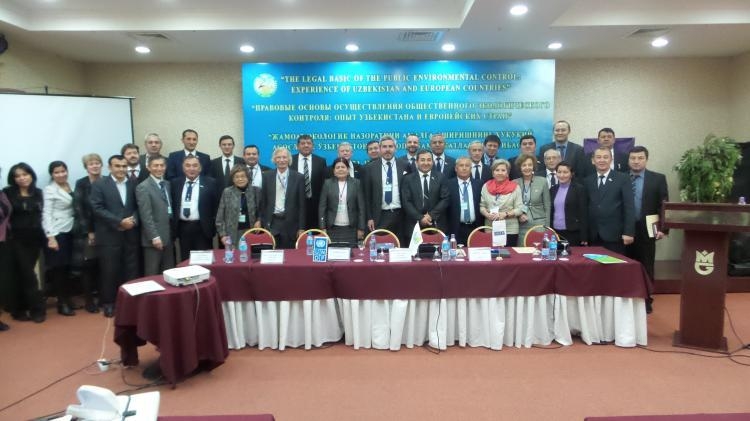Legal basis of the public environmental control
Uzbekistan
“Legal basis of the public environmental control: experience of Uzbekistan and European countries”at Tashkent
Mister President,
Ladies and Gentleman,
Thank you to give me the floor and allow me to congratulate the organizers and particularly you Mister President by holding this conference.
Belgium, my country is not more in front on the topic of the public environmental control than other European countries, so I choice to propose today a short reflection on the crisis of the Aral Sea and suggest you the possibility of a Proposition of Resolution to address at United Nations.
But first of all 2 questions:
Is the disaster of the Aral Sea only an Uzbek problem or is it an international problem?
Have the drying out of the Aral Sea and the storms which swept the plain have an impact on the climate change?
Just remember that the Aral Sea, the fourth-largest lake in the world (67.000 square KM), become in fifty year a new desert of salt and pollutions with an area 60.000square Km of plains (equivalent at Croatia (more the Denmark))
Why? How? What to do?
Why a desert? And what kind of desert?
Everybody knows the abuse and unconsciousness of the Soviet Government and their pharaonic project plan which have dried out the Aral Sea by the diversion of the Amu Darya & Syr Darya Rivers for big projects of irrigation, transforming the desert areas in big agricultural farms. Planned in 1018 by the Bolshevik authorities, it was executed in 1960 to blow up the production of cotton and rice.
Less well known is that the Aral Sea was also a chemical disaster. During 40-45 years, the region was intensively sprayed by the soviets with 2 persistent pesticides: DDT and Lindane, often from airplanes that also flew over villages and cotton field workers. Some 150.000 tons of pesticides were used and carried by the rivers on the seabed of the Sea each
And I shall not get into detail on the top-secret biological soviet laboratory (1954 to 1992) on the island of Vozrozhdeniya, where tests were performed with smallpox, plague and anthrax, including open-air tests of anthrax bombs. ! During the Soviet era, hundreds of ton Anthrax was made. This site were fortunately disinfected by the Uzbek Government & United States.
With what consequences?
The human activities as the excessive erosion of lands, deforestation and overexploitation of water resources favored the development of dry zones and the drying out of the Aral Sea intensifies this process.
In addition to the temperature steadily increasing, the dust and salt storms are coating the mountain glaciers nearby and causing a decrease in the overall volume of ice. The degree of melting is over twelve times the rate of the pre-cotton growing era and, as there is less moisture in the air to replace the dissipating snow the glaciers continues to diminish.
Only an Uzbek problem?
The dust does not know the political borders! The strong north-easterly winds pick up the sand, salt, and dust blow through the Aral Sea). About 10 dust storms occurred per year in the Aral Sea region, carrying dust in all directions during 90 days during the year.
"In 2002 the U.N. estimated that winds carried every day 200,000 tons of salt and toxic sand throughout the Aral Sea region and thousands of miles beyond, sometimes reaching as far as Russia's Arctic north—a problem that still continues"(Conant 2006).
We are all concerned!!
In 24 years, going out of an archaic, totalitarian political system and planned collectivist economy everything was to make and Uzbekistan acted on all fronts!!
Learn independence, ensure the security of the country and the population, imagine another economy, draw up a Constitution, organize elections, establish a Parliament, set up a Government, ensure the welfare of the Uzbeks,... register progressively towards democracy, ensure recognition of Uzbekistan into the International Community and of course fight against the pollution. Particularly in a difficult international environment, I think for example of extremism, terrorism, geopolitical confrontations, human trafficking, and money laundering …
So what to do?
Of course we must continue to encourage the Government to pursue his numerus efforts for a sustainable development in Uzbekistan whit a solid legal framework for the protection of the environment and implementation of environmental control.
What else? Several scientific initiatives were already taken and are still taken today by the scientific community! Important and indispensable!
We can do more! The Aral Sea and the Aral region are an important problem which need more concrete actions and solutions, in particular I thing of a Proposition of Resolution of a Special Trust Fund under the auspices of the United Nations that we can together draft today

